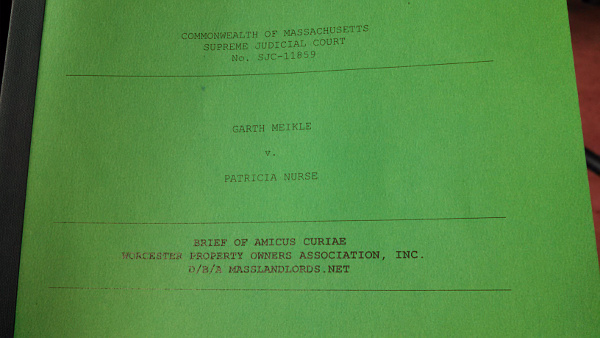Tenant overstays by 18 months beyond lease because of the $3.26 owed to them
| . Posted in evictions, financials - 0 Comments
Those of us experienced with Massachusetts laws and politics won't be surprised to hear that Harvard Legal Aid Bureau is behind the latest anti-landlord court action, or that it has blown all out of proportion.

Landlord Garth Meikle notified Patricia Nurse, his tenant-at-will, back in April 2014 that he would be taking the apartment back to give to his son. His son had just been married.
The rent was $1,300 and the landlord had taken $1,300 from the tenant as a security deposit. He placed the deposit in a separate interest bearing account. He failed to give the proper receipt to the tenant. Also, he asked the bank manager to pay the interest out each year. The manager, unsurprisingly, ignored the requests.
These two oversights were a violation of MGL Ch 186 Section 15b, the security deposit law. The tenant, in combination with Harvard Legal Aid, is now claiming a right to remain the apartment:
- I didn't get my receipt!
- I was owed three whole dollars and twenty-six cents!
If the basis of the law is fairness, then surely the tenant should move out before the SJC case is heard. 18 months' extra residency is more than fair compensation.
But the case has devolved into a battle of technicalities. What happens if the landlord has completed a lawful eviction but at one point unlawfully owed the tenant $3.26? Does that completely undo the eviction?
MassLandlords signed onto an amicus briefing written by Attorney Peter Vickery (Springfield), and improved by feedback from Attorneys Stanley Komack (Springfield) and Emil Ward (Cambridge). The gist of the briefing is that the landlord does owe the tenant money under the security deposit law but that such debt does not completely undo the eviction.
There are good and logical reasons why this should be so. We argue that the landlord and tenant should have settled up and parted ways.
Perhaps the case is dead-on-arrival. Other less prominent cases have already been decided that have undone evictions like this for similar reasons.
We can only hope that fairness should once again return to Massachusetts landlord-tenant law. Stay tuned for the decision.
This landlord, by the way, is representing himself.
Facts and information from Massachusetts Lawyers Weekly.




